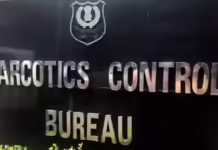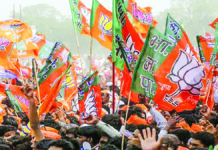KOLKATA: Troubling coincidences have come to light from reports of communal violence in West Bengal—from Murshidabad to Maheshtala. These have sparked widespread concern and allegations that law enforcement authorities are failing to curb mob violence involving minority communities.
On Wednesday, a clash broke out between two groups in Maheshtala—hardly 15 km from the heart of Kolkata—under Rabindranagar Police Station area, over the construction of a shop by a Muslim vendor by allegedly encroaching upon the land of a temple. As the police tried to intervene, minority community members threw stones which left many policemen, including an IPS officer, injured.
Social media posts and local accounts describe chaotic scenes, with claims that police have been ineffective or reluctant to intervene, raising questions about law and order in the state.
“The incident took place barely 200 meters away from the Rabindranagar Police Station. Yet for more than two hours, the police just stood by and let the mob attack our temple and demolish our tulsi mancha,” said an eyewitness, who requested anonymity.
“For close to two hours, hundreds of people kept throwing stones targeting our houses. Imagine, this happened when the police station is in the vicinity. For two hours, no police came to save us,” said 63-year-old resident, Ramjanki Mahato.
Fifty people were arrested in connection with the clashes between the two groups and prompted the administration to impose prohibitory orders in the area.
The Opposition BJP demanded the deployment of Central forces in the trouble-torn area, while the ruling Trinamool Congress accused the saffron party of politicising a local issue.
In a social media post, BJP leader Suvendu Adhikari accused the police of “attempting to whitewash a blatant communal attack on Hindus… reducing it to a mere clash between two groups”. He alleged that the Mamata Banerjee government was giving a free hand to minorities to indulge in violence without fear of retribution from the police. “Mamata has told the police to sit tight and let her lungi-wearing brothers run amok and kill Hindus without any fear,” he told The Sunday Guardian.
Trinamool Congress spokesperson Kunal Ghosh said the BJP was trying to incite communal passions over the Maheshtala violence. “Among the five arrested from Budge-Budge, Nabin Chandra Roy has been identified as a declared BJP worker. Explosive materials were also recovered from them, intended to create unrest,” the Trinamool posted on social media.
A police officer, speaking anonymously, described the situation as alarming, with law enforcement personnel struggling to maintain control. Section 144, prohibiting public gatherings, has been imposed to restore calm, but tensions remain high.
“Those who attacked houses and cars were not local residents. It would have been a matter of a few minutes had police acted promptly,” says Najimuddin Laskar, a resident of Kankhuly area. Abdul Alam, a shop owner too said that no local Muslims were involved in the clash.
The same pattern was detected in Murshidabad between 8 and 12 April when a mob protesting the Wakf Amendment Act targeted Hindus and their properties. Hundreds of houses of Hindus were set on fire even as the police stood idle. A father-son duo, Haragobindo Das and Chandan Das, were lynched by a mob. Hundreds of Hindu families were forced to flee Dhulian, Suti and Samsherganj in Murshidabad by crossing the Bhagirathi river in boats in the dead of night. They took shelter in makeshift camps in Malda district.
A probe committee set up by the Calcutta High Court to look into the Murshidabad violence says that violence during and after the anti-Waqf protests against Hindus was carried out at the behest of some Trinamool Congress leaders. The report says that local councillor Mehboob Alam was seen with the miscreants who identified and burnt down houses belonging to Hindus. It also cites eyewitness accounts which say that the local MLA came and saw the violence and then went away.
The High Court committee report quoted victims of the violence saying that they made hundreds of frantic phone calls to the local police station, but no one picked up the calls. “No one came from the police station situated less than 500 meters away,” a victim was quoted as saying to the High Court team.
In both instances—Murshidabad and Maheshtala—local residents and political figures have accused the police of selective inaction due to “political pressures”. These allegations, widely circulated on platforms like X, have fuelled public outrage, with hashtags such as #Maheshtala and #Hindu trending in the region.
However, state government officials have denied claims of bias, asserting that police are working diligently under challenging circumstances to maintain peace.
The West Bengal Police issued statements emphasizing their commitment to impartiality, noting that arrests have been made across communities involved in the unrest. Official reports indicate that more than 50 individuals have been detained in connection with the Maheshtala violence alone, though no breakdown by community has been provided. The state government has also deployed additional forces to sensitive areas and urged citizens to refrain from spreading unverified information online.








